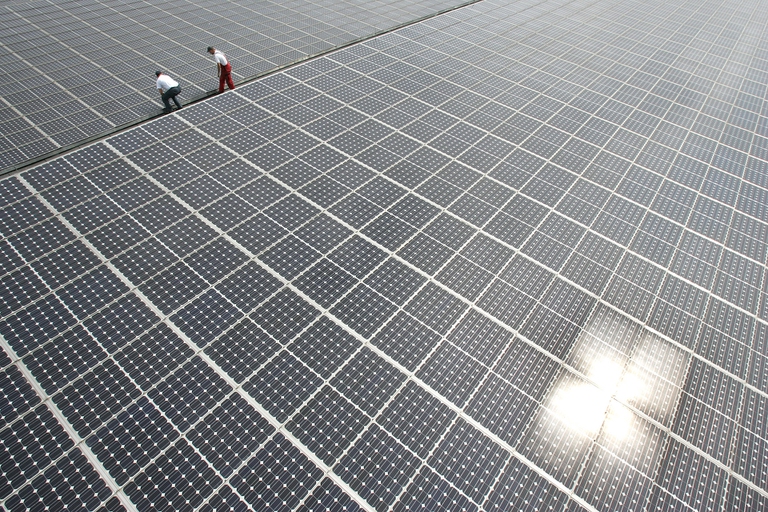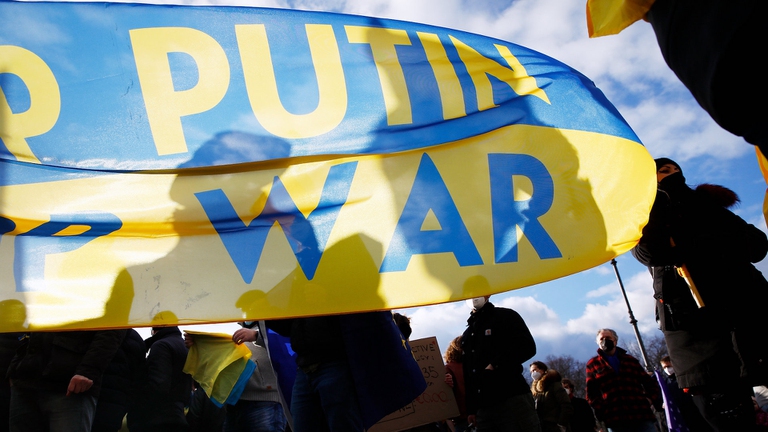https://www.lifegate.it/guerra-ucraina-scenario-energetico
- |
- A year has passed since the start of the war in Ukraine and the energy scenario has changed a lot since then.
- Russia's role as an exporter of fossil energy has significantly diminished.
- Renewable energy sources have continued to grow, producing enormous economic savings.
TO one year since the start of the war in Ukraine, the energy scenario has changed.And a lot too.In fact, before declaring war, Russia was far the largest exporter of oil and natural gas on world markets.Since then, its position has greatly diminished.An example above all is the gas:Russian flows to Europe are dropped by 80 percent in just one year.
Crude oil and coal exports also fell:in the case of petrolium this is a small reduction, but most of it is now sold at deep discounts and with fewer and fewer buyers, at least in advanced economies.Even the parable of coal is descendant:After an increase in coal-fired electricity production in early 2022, use of the more polluting fossil fuel is also declining.The European Union (EU) imported 22 million tonnes more coal in 2022 as part of an emergency strategy, but two-thirds remained unused.
At the same time, cleaner alternatives Russian fossil fuels are growing rapidly as governments seek to strengthen their energy security amid the crisis.

After the start of the war, 12 billion euros saved thanks to wind and solar power
Some data can help to better understand the energy landscape that has been created.The fossil fuel that has lost the most is certainly gas: thanks to wind and solar, which reached a fifth of EU electricity production for the first time in 2022, we saved 12 billion euros which, otherwise, would have been spent on gas.This is supported by the new relationship published by energy think tank Ember.
Furthermore, a new analysis of Zero carbon analytics shows that the EU already has replaced almost 75 percent of gas imports Russian fossil fuel, while total gas demand fell by 10 percent in the first nine months of 2022.By 2030, a further decline of 43 percent is expected across the bloc.Meanwhile, second Transition zero, the cost savings offered by renewable energy and storage compared to fossil gas have doubled with with the war in Ukraine.
Renewable energy capacity added globally it increased by about a quarter in 2022.Sales of electric cars at a global level have increased by almost 60 percent, investments in energy efficiency have increased, as have the installations of heat pumps.
Skyrocketing prices have pushed more people into energy poverty
And if it hadn't been for renewables, the increases would have been even greater.Already like this Energy prices have skyrocketed:reason that pushed politics towards emergency actions.The EU spent 252 billion euros on fossil gas imports in the first nine months of 2022, with an increase of almost 300 percent compared to the previous year.
These dizzying costs have increased earnings of the oil majors, from BP to Shell, who have registered record profits, equal to more than 100 thousand euros per minute.These grotesque numbers were achieved thanks to the surge in energy bills which, according to a study published in Nature energy, he could push up to 141 million more people in the world towards extreme poverty.
And speaking of contingency plans, an emblematic case it is that of Italy, which before the start of the conflict imported 45 percent of its gas from Russia.The strategy adopted by the different governments that followed one another - first that of Mario Draghi and then that of Giorgia Meloni - was that of stipulate supply contracts with new energy partners.In this wake, Italy has signed bilateral pacts with Libya, Algeria, Congo and Mozambique where Eni plans to explore new fossil deposits.
But despite the new international agreements which still see the exchange of fossil fuels at the centre, once again it was renewable sources that guaranteed greater economic savings:who owns a photovoltaic system combined with accumulations (batteries) can self-consume energy up to 70-80 percent and disconnect from the methane network after electrifying consumption.Yet another demonstration that despite short-sighted political choices, renewables are rewarded by the market.

The war in Ukraine rewrites the geopolitics of renewables
In short, the Russian president Vladimir Putin has unintentionally accelerated the energy transition, pushing European Union countries to reduce their dependence on fossil fuels in favor of low-cost renewable energy.
“Governments deserve credit for responding to this complex and unprecedented energy crisis,” said Fatih Birol, Executive Director of the International Energy Agency.“My hope and expectation is that they don't stop now.Instead, they must continue to accelerate the transition to clean energy.This is important not only to reduce emissions, but also because the crisis has shown us that faster transitions increase energy security, create jobs and stimulate industrial growth."
Despite the need, proven by many, to reduce dependence on fossil fuels, some governments continue to defy logic, building more fossil gas infrastructure that threatens to derail Europe's climate ambitions (apart from the fact that investing in fossil fuels is a wasteful investment in the long run).If there is a time for rewrite geopolitics of renewable energy, that time is now.
